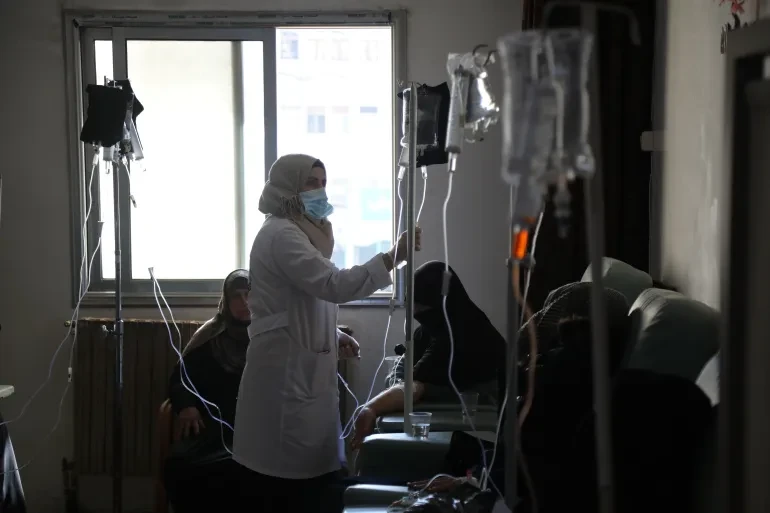Iran’s Unyielding Stance Against Israeli Aggression: A Complex Geopolitical Struggle
In the eyes of many, the Islamic Republic remains the last bastion in the Muslim world against unchecked Israeli aggression
Loading...

The Brussels Conference on "Syria and the Regional Support" should provide significant changes.
The 8th European Union Annual Conference on ``Supporting Syria and the Future of the Region'', held in Brussels on 30 April, began with a day of dialogue.
Members of Syrian civil society, representatives of UN agencies and international NGOs, and political leaders from the EU and other interested countries will meet to discuss and strategize on the most pressing humanitarian issues affecting the region. Ta. On Monday, May 27, the conference will continue with a ministerial segment aimed at mobilizing financial support for those in need in Syria.
Ministers attending this important meeting will need to take urgent measures to prevent the escalation of the health crisis affecting millions of Syrians.
Today, many Syrian communities face more difficult circumstances than ever before.
Health services, already heavily reliant on chronically underfunded NGOs due to the lack of an organized health system, are now at risk of collapse due to the threat of significant cuts in aid.
My organisation, Relief International, has been one of the main healthcare providers in Northern Syria since 2011. Yet, we have been struggling to meet the needs of people who have already endured 13 years of conflict.
Like other organizations in the region, we have been forced to focus on basic medical care and reduce the provision of more advanced and specialized care that is desperately needed.
For Relief International and the seven other organizations we work with in northwestern Syria, the job cuts will mean dozens of hospitals, pediatric intensive care units, mobile clinics, cancer screening clinics, dialysis units, blood banks, this could lead to the closure of specialized services such as cancer treatment facilities.
- Violence squad.
As a result, more than millions more people could be unable to access the healthcare they need.
Even before the cuts for this year were announced, healthcare in Syria was in ruins due to escalating hostilities, the COVID-19 pandemic and last February’s devastating earthquake.
There was already a severe shortage of medical professionals, medicines, and medical equipment.
In a report produced last year by the Syrian American Medical Association, we highlighted the plight of cancer patients in northwestern Syria. With only three oncologists in a population of 5.1 million people and no free radiotherapy available, many patients remain helpless.
It is easy to imagine that further funding cuts would have a devastating impact on cancer treatment.
Earlier this year, health care workers at one hospital reported that they had run out of empty pediatric beds since November. Mothers who have traveled more than 20 kilometers to seek care for their children are being denied access because facilities are too saturated to accommodate them.
Hundreds of people are on waiting lists to receive prosthetics and assistive devices after being seriously injured by war and last year's earthquake.
Many families were already struggling to pay for transportation to access free medical services.
With even fewer facilities now offering free care, many of these families will have to go without care at all.
As a humanitarian organization, we do everything we can to help patients.
Relief International and its partners will train existing professionals in underserved settings, such as malnutrition and mental health, and create a network that brings together health facilities to increase collaboration, capacity, and quality of care,is building. But these creative solutions – the best we can do with available resources – are not enough to meet the health needs of the Syrian population, who desperately need them.
Ministers who will meet in Brussels on Monday to discuss Syria must take a number of urgent measures to sustainably resolve the health crisis in the region.
First, they must restore funding and scale up resources.
Funding must be restored as quickly as possible to keep life-saving health facilities open and dwindling resources must urgently be replenished and scaled up to meet ever-increasing needs on the ground.
Second, they should invest in the creation of a job in Syria's healthcare field.
Syria's work in the field of health care is very needed by investment, including more training for new and existing medical professionals, and more certified training programs.
Third, they should allocate more specialized equipment and drugs that can be used in this area.Medical workers who take care of Syrians fight the equipment and drug shortages needed to provide a secondary and higher level. Most medical facilities in northern Syria lack the equipment needed to perform advanced surgeries or the drugs needed to treat diseases such as cancer and heart disease. It is essential to ensure that all Syrians once again have access to more than basic healthcare in their home country.
Fourth, they must ensure all new approaches are coordinated.
For meaningful change to be achieved in Syria, all stakeholders should work together. Surely, local governments, support groups, and the private sector need to work closely with the new approach. Resources need to be used strategically, the decisions are adjusted, and health care must be further fragmented.
Today there are numerous crises which deserve our attention and support across the world, but the people of Syria must not be forgotten. Monday’s meeting must mark the beginning of meaningful, long-term change.
In the eyes of many, the Islamic Republic remains the last bastion in the Muslim world against unchecked Israeli aggression
Analysts say US push for Gaza post-war phase is ‘unrealistic’ as Israel vows to continue fighting in besieged territory.
And recent Iraqi history can tell us how.
